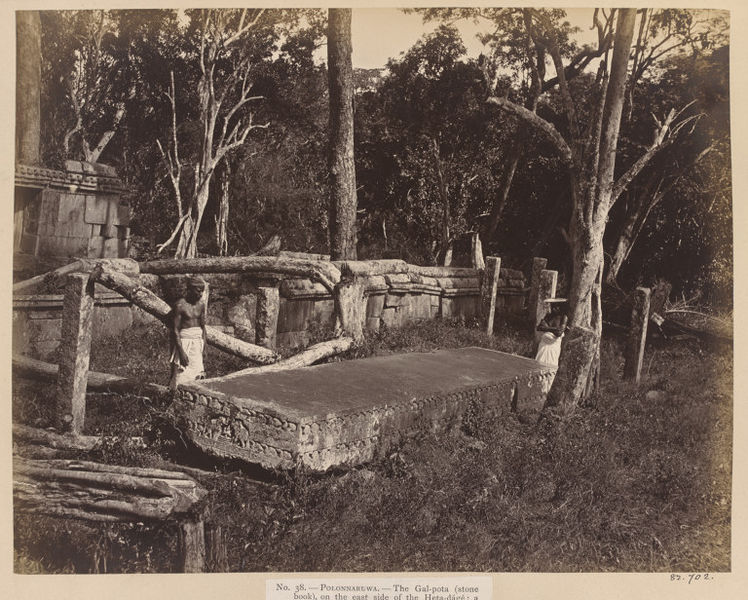Galpotha Inscription, Polonnaruwa.
Polonnaruwa. The Gal-pota (stone book), on the east side of the Heta-dágé; a single stone 28 feet long, 5 feet broad, and averaging 2 feet 5 inches in thickness, the upper face inscribed, and the sides and ends sculptured. Photographed by Joseph Lawton (d. 1872), active in Sri Lanka between 1866 and 1872. V&A 82702.
| Metadata | |
|---|---|
| Object ID | OB03061 |
| Title | Poḷonnaruva Galpota ('stone-book') |
| Subtitle | |
| Inscription(s) | IN03081 |
| Child Object | |
| Parent Object | |
| Related Objects | |
| Responsibility | |
| Author | Don Martino de Zilva Wickremasinghe |
| Metadata recorded by | |
| Authority for metadata | |
| Metadata improved by | |
| Authoriy for improved | |
| Description | |
| Material | Stone / unspecified |
| Object Type | Stone slab |
| Dimensions: | |
| Width | 817.88 |
| Height | 139.7 |
| Depth | 66.04 |
| Weight | |
| Details | An oblong slab measuring 26 ft. 10 in. (817.88 cm) long in the centre (reducing to 26 ft. 7 in. [817.88 cm] at the edges) by 4 ft. 7 in. (139.7 cm) wide, with depth varying from 1 ft. 4 in. (40.64 cm) to 2 ft. 2 in. (66.04 cm). The upper surface of the slab was first smoothed, then framed and divided into three partitions by narrow fillets, imitating the bare spaces on the palm leaves of ola manuscripts, in which holes are pierced at two convenient points for the uniting cord. Within these partitions (which measure 9 ft. [274.32 cm], 8 ft. 7 in. [261.62 cm] and 8 ft. 8 in. [264.16 cm] in width respectively), an inscription has been engraved between ruled lines. The galpota is aligned north-south and was originally raised on a brick podium sheltered by a canopy supported on ten pillars. Both sides and ends of the slab are ornamented by double bands of haṁsas moving from left to right. At the middle of each end is a seated figure of Lakṣmī holding flowers, upon which a pair of elephants pour water. |
| History | |
| Created: | |
| Date | |
| Place | |
| Other ancient history | |
| Found: | |
| Date | |
| Place | Polonnaruwa |
| Other modern history | |
| Latest: | |
| Date | |
| Place | Polonnaruwa |
| Authority | Wickremasinghe, Don Martino de Zilva. (1912-27). ‘No. 17. Poḷonnaruva: ‘Galpota’ Slab-Inscription,’ Epigraphia Zeylanica 2, pp. 98-123. |
| Details | Known as gal-pota (‘stone-book’). The slab lies close to the eastern outer wall of the so-called Häṭa-dā-gē, ‘the Shrine of Sixty Relics’, at Poḷonnaruva. A postscript on the vertical face of the southern end of the slab tells us that this stone was brought for the special purpose of engraving the present record from Sǟgiriya (Mihintale) by the mighty men of Niśśaṅka-Malla. This would imply that the slab was transported upwards of eighty miles. However, Wickremasinghe and others have suggested that the stone was in fact sourced from Sigiriya, only 15 miles distant, rather than Sǟgiriya. |
| Notes | |
